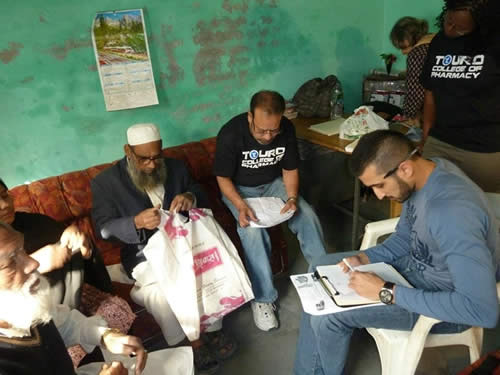Touro College of Pharmacy Students Travel to India to Run Health Camps in Poor Urban Communities

Dipan Ray, Ph.D., director of practice experience at Touro College of Pharmacy in Harlem (middle), and Ravi Shah, a doctor of pharmacy (Pharm.D.) candidate at the College (right), work together to interview a patient at a makeshift “health camp” in New Delhi. They were part of a team of six students and three faculty members who recently ventured to the slums of India where most of the residents lack access to primary health care. They gathered information on diet, past medical history and current medications in order to provide an optimal check up. Photo credit: Danny Tea
The women who had come to the makeshift “health camps” to see the student pharmacists from Harlem had ongoing pain in their bones. Some were so thin that their gaunt arms would not hold a blood pressure cuff. One man had collected so many medications that he stuffed them into two shopping bags and brought them to the camp to be sorted, identified and ultimately thrown away.
“He had no idea what he was taking, or the expiration dates of his drugs,” said Steven Elrod, a doctor of pharmacy (Pharm.D.) candidate at the Touro College of Pharmacy in Harlem. “He had ten years of medications. Many were not needed. At the end he left with one small zip-lock bag.”
Elrod was one of six Touro pharmacy students who, with three faculty members, recently ventured to the slums of India. The group spent four weeks in the poor neighborhoods of New Delhi and Agra, where most of the residents lack access to primary health care. They screened residents for hypertension, diabetes and pulmonary impairment. Residents needing treatment were referred for medical services, and attempts were made to counsel them on how to improve their health, prevent disease and use their medications properly.
“The students were well-prepared for their work in India by the public health courses and training that is part of our curriculum, and by prior rotations addressing the needs of disadvantaged communities, a commitment of the Touro College of Pharmacy,” said Dr. Audrey Jacobson, M.D., MPH, professor and director of public health education, practice and research, who helped lead the trip.
In India, the Touro group collaborated with the Urban Health Resource Center (UHRC), a non-profit organization in New Delhi that works to improve health of the urban poor living in slums and settlements. The Touro students screened about 350 patients (more than twice as many as anticipated) and in addition to the counseling, created a database of proper medications that they left behind for UHRC to help residents obtain appropriate medications.
In addition to Elrod, the other students participating were Glenn Morataya, Ravi Shah, Jillian Brown, Jessica Cate and Danny Tea. The students worked under the supervision of Drs. Jacobson, Dipan Ray, Ph.D., director of practice experience, and Ronnie Moore, Pharm.D., senior director of practice experience.
The students showed unflagging dedication, working 10 to 14-hour days under physically trying conditions, often going without lunch and falling ill themselves. Sanitation was poor and the air heavily polluted. Supplies ran short and the hurdles were many, including cultural differences and disparities, and language barriers. UHRC staff helped the group understand some of the differences, taught them Hindi and helped them educate and counsel patients about the options available to treat their conditions.
Still, the students recall the many challenges. Patients were seen in living rooms, where families rearranged their furniture to accommodate the screenings, or small rooms resembling college dormitories. The conditions — short on space and privacy, coupled with language barriers — were not ideal for patient interviews, blood pressure readings and counseling. Translators and body language were called into play.
Often patients did not return for counseling and when they did, advice given was not always followed. “No one knew the concept of a one month supply and adherence,” said Shah. “Medications were cheap, but not many knew how to take them properly,” said Morataya.
Sometimes the students had to try to solve problems quickly as best they could, when there were no obvious solutions. For example, women with decreased lung function reported they lived in households with husbands or others who smoked; the students could only advise them to try to speak with family members about smoking away from the house. Others rode motorcycles in New Delhi’s highly-polluted streets. “We could only tell them to wear scarves and keep their faces covered outside,” recalled Tea.
Brown wanted to go home after the first day. “It was a bit intimidating at first,” she said. Reflecting back though, Brown concluded the trip was one of the best experiences of her life. “I saw how people lived and how they didn’t have access to what we have. I saw the opportunity to educate patients and improve their quality of life.”
Added Cate: “The whole experience embodied the potential for what pharmacists can be in the realm of public health.” Cate’s colleague, Morataya, said, “This is where I learned public health, and on a global level, too.”
Dr. Moore emphasized that the experience would not have been possible were it not for the assistance of the UHRC. “Their organization and skills will be integrated into our ongoing public health efforts here in Harlem,” he said. #
